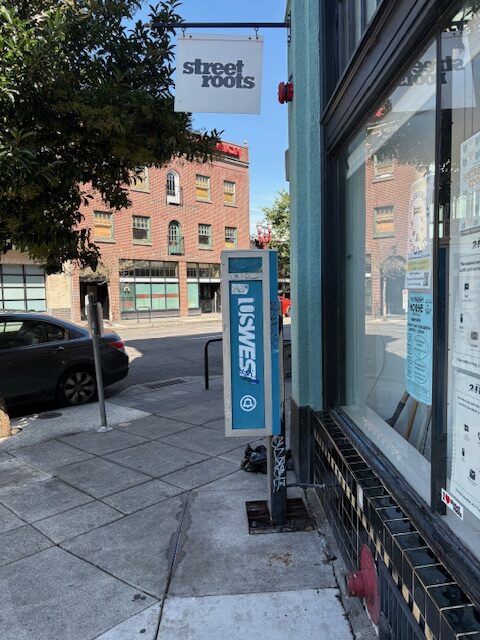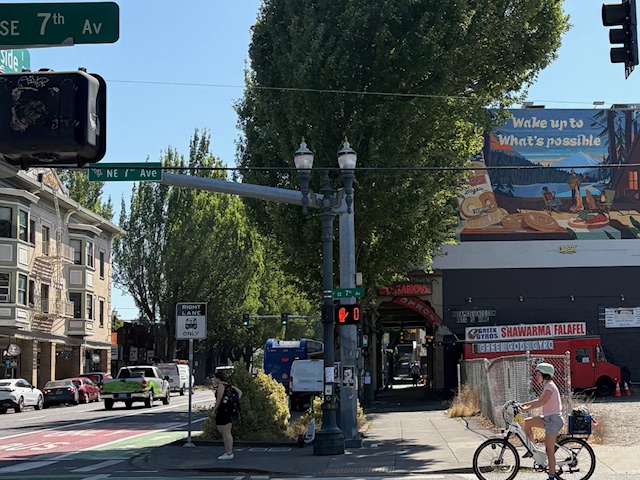Thoughts on the walk home after volunteering

I’ve been volunteering with Street Roots since April. They publish a weekly newspaper sold by people experiencing homelessness and poverty. They do important work to provide a source of income to people who need it, but it’s also a terrific paper. Once a month, I walk west across the Burnside Bridge to the Street Roots office to meet with a vendor and interview them, so I can write a short profile about them for the paper. This past Friday was one of those days. Although the person I met with was friendly and glad to be profiled, I struggled some to draw them out enough to be able to write a good piece. On the way home, I was thinking about the conversations I’ve had there.

There are folks who walk in with a story to tell, who want to be seen and heard, who want to tell you what their life is like and what their challenges are; what is hard about it and what they love. It’s an honor to get to be the one who listens to them say whatever they want to say about themselves. It feels like they don’t get many chances to sit down with someone and be heard for as long as they’d like to talk. When I applied to write vendor profiles, I thought that the published piece itself would be the most important part of the work—that my writing would help to give voice to the unhoused, and would humanize them, show them to be individuals with stories worth telling. The profiles do that, and it does matter. But I was surprised to find that it’s the interviews themselves, the face-to-face conversations that I have with the vendors, that actually feel like the most vital part of it—just being there and listening to whatever they want to tell me. When I meet with someone who is eager to share their story, I walk out of the interview aglow. Both of us will be a little giddy as we go together to the front desk to let the staff know we’re done. The connection we’ve made in those 30 or 40 minutes can feel almost holy. But therein lies a danger. It’s easy, on those days, to romanticize this volunteer work. To be a little too proud of it, a little too impressed with myself for doing it. Anytime the ego flares up like that, it’s worth taking a second look, checking yourself. The Street Roots vendors aren’t pariahs because they’re unhoused or poor, but they aren’t saints because of it, either. They’re just human beings with stories to tell, like any of us. To romanticize the people I’m volunteering to help also dehumanizes them. That’s a lesson I’ve had to learn before, in past volunteer work, but it seems to be one that I need to relearn from time to time.
Then there are the vendors who want to talk about themselves, but feel shy about it and need to be drawn out. It takes time to earn their trust and to get them to get going, to open up, but it’s rewarding when they finally do.

And then there are others, who don’t really seem to have much to say. They’re nice, they’re polite, but it’s like pulling teeth to get any story out of them. There’s a protective layer cast over all of their responses. Nothing particularly bad happened in their past. Nothing particularly bad is happening to them now. Nothing particularly good happened in their past or is happening now. Everything has always been fine. Everything is fine now. They’re grateful to their regular customers. They’re grateful to Street Roots. End.
Those kinds of conversations are harder for me, because I want to get enough material to write a profile that will make them feel seen and understood as they want to be seen and understood, but I don’t want to be like, Show me your scars. Tell me how you’ve suffered. It’s not about that. The point of these profiles isn’t to create trauma porn for the paper’s more-fortunate readers. The vendors’ traumas or fears or losses or how they came to be unhoused are none of my business unless they choose to share it. I also don’t want to press too hard for positive memories or hopes they hold for the future, because that protective façade has been constructed for a reason. But these more withholding types of interviews are frustrating, because I need to learn who the vendors are well enough to write about them, to give the readers an idea of who this person is—the individual behind the Street Roots badge.

The mission of Street Roots is to create employment and stability for people experiencing homelessness and poverty. The goal is to get money into the vendors’ hands. When a vendor agrees to be profiled, they’re paid $20 and given extra papers to sell the week that their profile is published, and they also often enjoy a boost in tips that week via the Street Roots Venmo. Some of them really want to tell their stories, yeah, but I think that for most of them it’s also, or even mainly, about that extra income. That’s more than fine. That’s the whole point, right? But it’s such a challenge to draw out the folks who are only doing it for that financial reason, and who aren’t comfortable opening up to me. But that’s also fine. It’s okay that the volunteer gig is hard sometimes, that it sometimes feels like work. It’s an important reminder for me that I’m facilitating an economic transaction that will have a significant impact on this individual who has agreed to sit down in a room with me. It isn’t romantic. It isn’t holy. I don’t walk out of there feeling that a deep human connection has been made, like I do when someone really wants to share. But that’s okay. None of these people owe me their stories.
Writing for Street Roots has been an exercise in humility because of the vendors who are harder nuts to crack, but also because of how different it is from any other writing I do. Street Roots has stopped posting the vendor profiles on their website for some reason, so there is no link to click. There is nothing to share on social media. No evidence beyond the printed page, sold only in Portland and only by Street Roots vendors, that the work ever existed. That took getting used to. For the past twenty or so years, whenever something that I’ve written has been published, I’m accustomed to going online and saying, “Look at this thing I wrote.” But it’s been good, actually, that I can’t do that with the vendor profiles. It’s been another important reminder: This work isn’t about me. Not even a little bit. I’m giving my time, my attention, and my craft to 1) listen to people tell their stories in whatever way they want to tell them; and 2) write a piece about them that will make them feel seen and valued; and 3: help to put a bit more money into the pocket of someone who really needs it.
That’s enough. It’s more than enough.

Discover more from Cari Luna
Subscribe to get the latest posts sent to your email.

This was beyond a beautiful read. Thank you so much for writing this. Your self reflection, self awareness and ability to course correct is something sorely needed in this world.